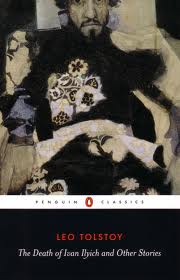Our book group choice for February 2010 is The Death of Ivan Ilyich by Leo Tolstoy. By the time he dies, Ivan Ilych has come to understand the worthlessness of his life.
The Death of Ivan Ilyich is a novella by Leo Tolstoy that was first published in 1886. It tells the story of a high-court judge in 19th-century Russia who comes to terms with his own mortality as he slowly dies from a terminal illness.
The novella is divided into five parts, each of which chronicles a different stage in Ivan’s journey from denial to acceptance of his death. In the first part, Ivan is initially unaware of his illness, but he begins to experience a series of discomforts that gradually worsen. He visits several doctors, but they are unable to diagnose his condition.
In the second part, Ivan’s condition worsens and he is forced to give up his work. He becomes increasingly irritable and quarrelsome, and his relationship with his wife, Praskovya, deteriorates. Ivan begins to have recurring thoughts about death, but he tries to suppress them.
In the third part, Ivan’s condition becomes so severe that he is bedridden. He is in constant pain and his physical and mental faculties deteriorate. He begins to question the meaning of his life and whether he has lived it well.
In the fourth part, Ivan’s suffering reaches its peak. He is in agony and he longs for death. He begins to see death as a release from his suffering, and he comes to terms with his own mortality.
The Death of Ivan Ilyich is a powerful and moving novella that explores the themes of death, dying, and the meaning of life. It is a story that has resonated with readers for generations, and it continues to be relevant today.
In addition to its exploration of these themes, The Death of Ivan Ilyich is also a masterful study of character development. Ivan is a complex and believable character, and Tolstoy traces his journey from denial to acceptance with great skill. The novella is also notable for its spare and unsentimental style. Tolstoy does not shy away from the ugliness of death, but he also does not dwell on it. Instead, he focuses on the inner journey of Ivan, and the novella is ultimately a story about hope and redemption.
The Death of Ivan Ilyich Discussion Questions
- Why might Tolstoy begin The Death of Ivan Ilyich with the funeral of the main character? How would the effect differ if it were told chronologically?
- What are the comic elements in the opening chapter, and how do they function?
- What is your initial impression of Ivan’s wife? Does your opinion of her change as the story progresses?
- Chapter Two begins with an important claim: “Ivan Ilyich’s life had been most simple and commonplace—and most horrifying.” Why might Tolstoy consider Ivan’s “simple and commonplace” life to be “horrifying”?
- As Ivan rises in his career, he fails in his personal life. What might Tolstoy be suggesting here? Why does Ivan find so much pleasure in playing bridge?
- Why does Ivan marry Praskovya Fedorovna? Why does their marriage deteriorate? Does either husband or wife receive your sympathy?
- Why do you think Ivan is comforted by the presence of the peasant boy, Gerasim? How does his attitude contrast with Ivan’s other visitors, especially the doctors?
- Compare the conduct of Ivan’s daughter with Ivan’s son. Why is this 13 year-old boy crucial to the novella’s final chapter?
- After three days of excruciating physical and mental pain, Ivan realizes that despite a futile life, he can still make amends. Is he right? Does he accomplish this?
- How do you interpret the light that Ivan sees at the very end? What might this light symbolize or suggest?
- Writer Cynthia Ozick says, “This novella is about learning, finally, that you have been living a lie, that you’ve failed to be true to yourself, that you’ve failed to be true to others around you, and that you failed. And it is about exploring the rupture of the lie.” Do you agree? Why or why not?

